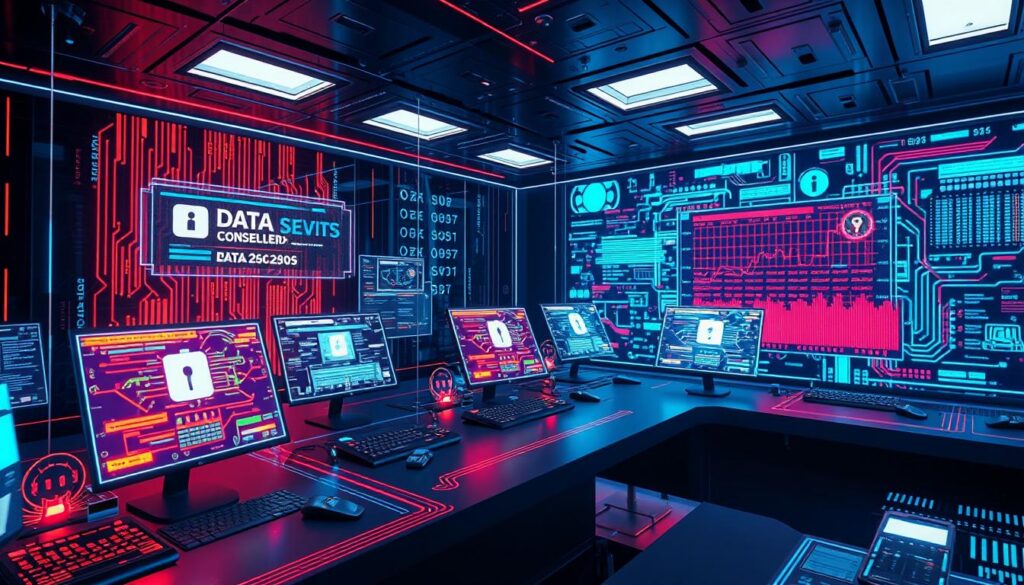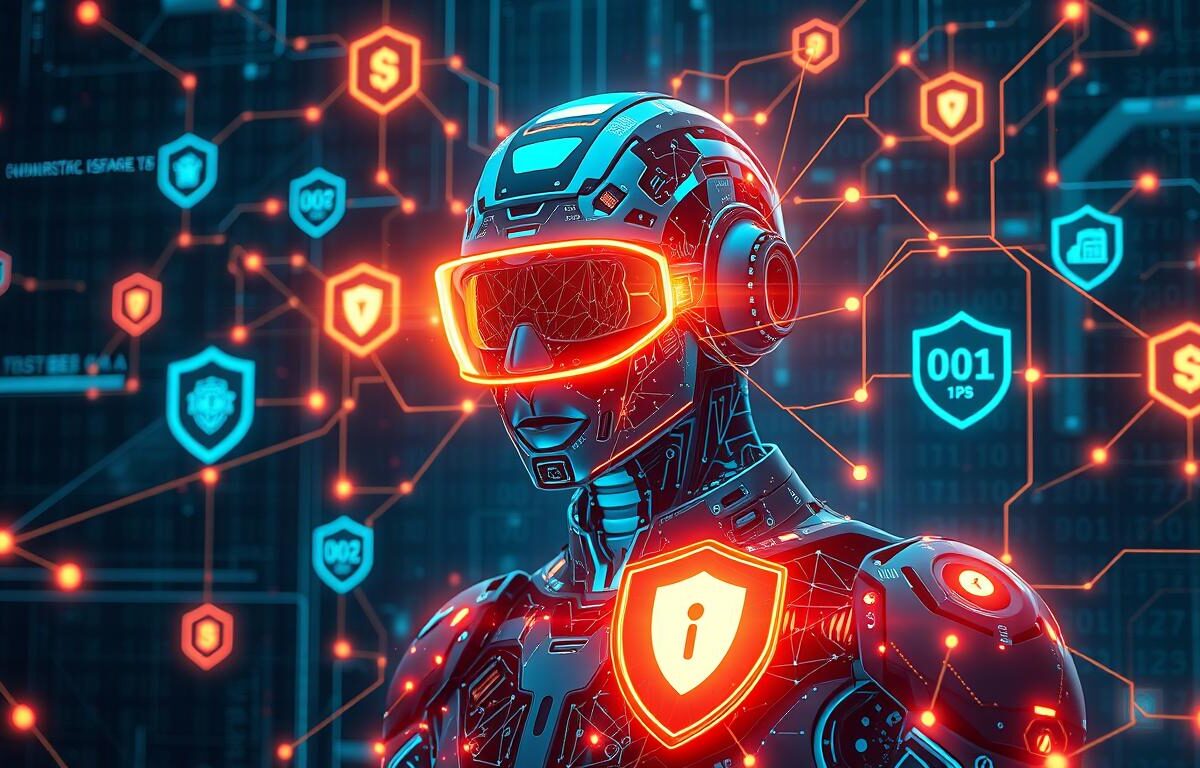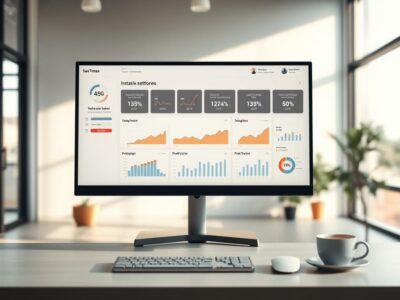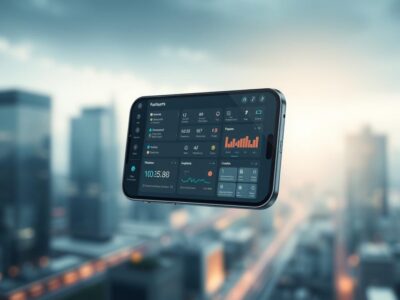AI agents for data security are more important now than ever. They work with many data sources, keeping sensitive info safe. This includes both structured and unstructured data areas. AI doesn’t just improve security; it changes to stop new dangers, making it very powerful.
The need for AI cybersecurity grows as we get more digital. Companies using AI chatbots must know about new risks. AI is great for workflow and data management. But, keeping them safe is really important.
AI chatbots can have weaknesses, either by mistake or on purpose. This can make customers lose trust. The risks are big because AI can use services in the user’s name. The Robust Intelligence AI Firewall stops these dangers. It checks for bad inputs and makes sure no personal info gets out.
Key Takeaways
- The integration of AI agents is crucial for modern data security.
- AI agents enhance security measures and adapt to evolving threats.
- Vulnerabilities in AI can lead to customer trust erosion.
- The Robust Intelligence AI Firewall protects against data breaches.
- AI cybersecurity is paramount for safeguarding digital assets.
The Role of AI in Modern Data Security
In the digital world today, AI’s role in protecting data is clear. Cyberattacks are more complex and common than ever. Organizations need strong solutions to keep their data safe. AI-driven cybersecurity can analyze millions of signals, something far beyond what humans can do.
AI helps with threat detection and response, making incident response better. Recent stats show a data breach in 2023 costs about $4.45 million. This highlights how crucial advanced data security tools, like AI, are. AI uses machine learning to sift through big datasets. This helps spot trends and dangers early.
Firms like Secuvy and CrowdStrike use AI to predict threats and boost defense. CrowdStrike’s Falcon platform, for example, uses AI for top-notch security. AI helps with finding and managing threats, showing how vital it is for protecting data.
But, using AI in data security isn’t easy. Integrating big data sets is key, as is protecting the most valuable data. Plus, there’s a big need for experts in cybersecurity to manage these systems. This shows the shortage of skilled professionals in the field.
Still, adopting AI in cybersecurity is critical. AI can quickly process large amounts of data, spot patterns, and adjust to new threats. It improves detection, works at scale, and helps teams across organizations. In the end, it plays a key part in keeping data safe against new cyber threats.
AI Agent for Data Security: Revolutionizing Data Protection
Introducing AI Agent-to-Agent Communication has changed data security a lot. Companies big and small see how AI can make their data safer. These AI agents fight off complex cyber risks by learning and predicting threats.

Combining AI communication with human know-how and good security habits is key. This mix improves quick decisions and adapts to unpredictable AI behavior. It’s a strong way to protect data.
The autonomous AI agent from ReliaQuest is a great example. Part of their GreyMatter tool, it understands the situation and acts fast, often in under five minutes. This shows the power of AI in keeping cyber spaces safe.
Cybersecurity uses different AI agents like chatbots and scanning software. They help by doing routine tasks and creating specific defense plans. This cuts costs and time while fighting threats better.
AI makes spotting and stopping threats quicker, improving security. As they learn about new dangers, AI agents update their defenses. This keeps them ready for new challenges.
However, using AI for data protection brings up privacy concerns. It’s crucial to keep the info exchanged between AI systems safe. This needs careful planning against possible security gaps.
By using AI for communication between agents, companies can protect against new cyber dangers. This keeps their data safe and private, showing the strength of AI in security.
Advanced Techniques for Secure Data Handling by AI Agents
Advanced techniques like data masking help secure data during AI-agent communications. Companies like Protecto use Data Masking Technologies to protect sensitive info among AI agents. These technologies anonymize personal data during interactions between systems.

Federated learning is a key solution. It lets AI agents learn and decide without sharing raw data. This protects privacy and boosts model performance across different platforms.
AI agents monitor access patterns and spot anomalies for data at rest. They use detailed filtering to safeguard sensitive info during processing. Techniques like data masking and tokenization keep data safe. They ensure rules are followed and data protection is strong.
| Technology | Key Features | Benefits |
|---|---|---|
| Data Masking | PII Protection, Anonymization, Tokenization | Ensures sensitive data remains confidential, enhances privacy |
| Federated Learning | Model Training, Privacy Preservation, Decentralized Data Processing | Improves model accuracy without compromising user privacy |
| AI-driven Monitoring | Anomaly Detection, Access Pattern Analysis | Protects data at rest, identifies unauthorized activities |
| Granular Filtering | Sensitive Data Identification, Access Control | Prevents unauthorized data access, enhances data security |
| Data Tokenization | PII Substitution, Data Security | Minimizes risk of data breaches, ensures compliance |
Together, these technologies form a strong approach to data safety in AI. They keep sensitive information secure, meet regulations, and follow ethical standards.
Choosing the Right AI-driven Data Security Solution
Today, picking the right *AI security solutions* is key for keeping sensitive data safe. More than 60% of company data is now in the cloud. This makes choosing effective AI-driven security crucial for businesses. They need to think about many things before deciding.
Securing data in the cloud is tough. A survey found over half have trouble with complete solutions in multi-cloud setups. This shows the need for *effective AI data protection*. Tools like SentinelOne and Darktrace offer strong threat spotting and can self-adjust. For example, SentinelOne can check over 2,000 settings automatically to keep security tight.
It’s also vital to work well with what companies already use. With 67% of companies keeping sensitive info in public clouds, and 44% unsure they can protect it, strong AI security is vital. SentinelOne stood out by catching every test threat in a big security checkup, proving its strength.
The cost is also a big deal. AI can save a lot of money. IBM says companies using security AI could save around $2.22 million by 2024. Small businesses are at big risk, with 60% closing after cloud hacks. Thus, affordable, strong AI security is a must.
Looking at different AI security options is important. Here’s a quick look at some top choices:
| Solution | Key Features | Pricing |
|---|---|---|
| SentinelOne | Endpoint, cloud, and data security, automated policy enforcement, advanced threat detection | $69.99 per endpoint per year for the basic plan |
| Arctic Wolf | “Concierge” service, tailored for SMBs without a SOC | Starts at $44,000 per year |
| Darktrace | Advanced threat detection, AI-driven insights | Starts at $30,000 per year on AWS for up to 300 Mbps and 200 hosts |
| Zscaler | Security service edge leader, AI-driven security | Contact for pricing |
| Vectra AI | AI-driven detections, machine learning insights | Contact for pricing |
Choosing an AI security system must fit your business needs. Think about the kind of data you have, how it can work with your current systems, and staying ahead of threats. Doing this helps make sure your AI security does its job right.
Conclusion
Thinking about the advancements, AI’s role in data security is both essential and changing the game. AI helps businesses protect their data better by using new techniques. But, tackling future challenges won’t be easy. Organizations have to stay alert and innovative. This is because security threats are always changing. A report by Accenture mentions a 223% rise in deepfake tool trades from early 2023 to early 2024.
Using AI to keep data safe is a powerful move for better cybersecurity. AI is not just changing things now. It’s also getting ready to fight future cyber dangers smarter. For this, businesses need to try new ways and follow laws like the EU AI Act, and those in Utah and Colorado. They need to be proactive. Adapting to AI in security can help deal with complex data and find issues that machine learning spots.
To wrap things up, AI is making data security much stronger and more tailored to needs. Leaders need to trust their AI systems to fight off AI cyber threats. Despite hurdles like ethical worries and technical issues, the perks are big. These include cost cuts, more efficiency, and better at finding threats. AI’s future in keeping data safe depends on growing these smart technologies. To dig deeper into this subject, you can read more here.
FAQ
What is an AI agent for data security?
An AI agent for data security safeguards sensitive info. It connects with various data spots to keep data safe. This system puts security steps into action automatically. It also adjusts to new dangers, protecting data everywhere.
How does AI improve data security?
AI boosts data safety by automating intricate security measures. It responds instantly to threats. Also, it works with different data sources. This ensures a wide-ranging shield for sensitive info against illegal access.
What are the main challenges in implementing AI for data security?
Big hurdles include mixing vast amounts of data and shielding the most vital data. Preventing unintended peeks and maintaining secrecy in AI chats is tough. Tweaking protection plans for AI’s unpredictability adds to the complexity.
How do AI agents interact and share data securely?
AI agents employ data hiding techniques to keep info secure during handling and sharing. They also use federated learning. This method lets AI systems learn and choose without swapping the actual data. It safeguards privacy across various platforms.
What is Federated Learning, and how does it enhance data privacy?
Federated Learning is a system enabling AI agents to learn together without trading actual data. This keeps data private across different setups. At the same time, it allows effective AI-aided data protection.
What factors should be considered when choosing an AI-driven data security solution?
Picking an AI-driven data security tool means looking at your business needs. Consider what data you handle, how it fits with your current systems, and if it can meet new threats. Go for solutions with top-notch data safety and AI communication defenses.



